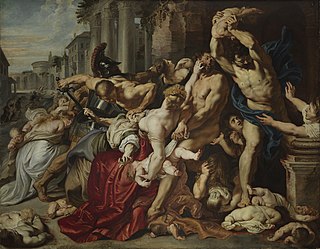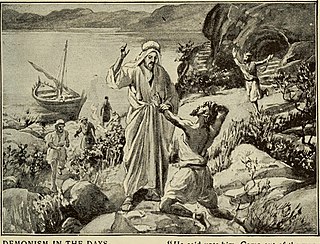Related Research Articles

Matthew 2:4 is the fourth verse of the second chapter of the Gospel of Matthew in the New Testament. The magi have informed King Herod that they had seen portents showing the birth of the King of the Jews. In this verse he calls together leading figures of Jerusalem to find out where Jesus was to be born.

Matthew 2:9 is the ninth verse of the second chapter of the Gospel of Matthew in the New Testament. King Herod has dispatched the magi to Bethlehem to find the infant Jesus. In this verse they follow the Star of Bethlehem to find the infant.

Matthew 2:16 is the sixteenth verse of the second chapter of the Gospel of Matthew in the New Testament.

Matthew 4:16 is the sixteenth verse of the fourth chapter of the Gospel of Matthew in the New Testament. In the previous verses Jesus returned to Galilee after hearing of the arrest of John the Baptist and then left Nazareth for Capernaum. This verse contains the second half of a quote from the Book of Isaiah, implying that these movements were preordained by scripture.
![<span class="mw-page-title-main">Matthew 5:17</span> [Truth] The proof of True Grace and Salvation.](https://upload.wikimedia.org/wikipedia/commons/thumb/4/4c/Ecclesia_et_synagoga.jpg/320px-Ecclesia_et_synagoga.jpg)
Matthew 5:17 is the 17th verse of the fifth chapter of the Gospel of Matthew in the New Testament and is part of the Sermon on the Mount. One of the most debated verses in the gospel, this verse begins a new section on Jesus and the Torah, where Jesus discusses the Law and the Prophets.

Matthew 5:19 is the nineteenth verse of the fifth chapter of the Gospel of Matthew in the New Testament and is part of the Sermon on the Mount. Jesus has reported that he came not to destroy the law, but fulfil it. In this verse he perhaps continues to reinforce this claim.

Matthew 5:45 is the forty-fifth verse of the fifth chapter of the Gospel of Matthew in the New Testament and is part of the Sermon on the Mount. This is the third verse of the final antithesis, that on the commandment: "Love thy neighbour as thyself". Jesus here explains why one must love one's enemies.
Matthew 9:10 is a verse in the ninth chapter of the Gospel of Matthew in the New Testament.
Matthew 11:14 is the fourteenth verse in the eleventh chapter of the Gospel of Matthew in the New Testament.
Matthew 14:3 is the third verse in the fourteenth chapter of the Gospel of Matthew in the New Testament.
Matthew 14:2 is the second verse in the fourteenth chapter of the Gospel of Matthew in the New Testament.
Matthew 14:8 is the eighth verse in the fourteenth chapter of the Gospel of Matthew in the New Testament.

Matthew 10:18 is the 18th verse in the ninth chapter of the Gospel of Matthew in the New Testament.
Matthew 14:12 is the twelfth verse in the fourteenth chapter of the Gospel of Matthew in the New Testament. It refers to the death of John the Baptist and the burial of his body.

John 1:29 is the twenty-ninth verse in the first chapter of the Gospel of John in the New Testament of the Christian Bible.

The Apparition(French: L'Apparition) is a painting by French artist Gustave Moreau, painted between 1874 and 1876. It shows the biblical character of Salome dancing in front of Herod Antipas with a vision of John the Baptist's severed head. The 106 cm high and 72,2 cm wide watercolor held by the Musée d'Orsay in Paris elaborates on an episode told in the Matthew 14:6–11 and Mark 6:21–29. On a feast held for Herod Antipas' birthday, the princess Salome dances in front of the king and his guests. This pleased him so much he promises her anything she wished for. Incited by her mother Herodias, who was reproved by the John the Baptist for her illegitimate marriage to Herod, Salome demands John's head on a charger. Regretful but compelled to keep his word in front of everyone present, Herod complies with Salome's demand. John the Baptist is beheaded, his head brought on a charger and given to Salome, who in turn gives it to her mother.

Matthew 12:43-45 is a passage comprising the 43rd to 45th verses in the twelfth chapter of the Gospel of Matthew in the New Testament.

Matthew 13:1-2 are the first two verses in the thirteenth chapter of the Gospel of Matthew in the New Testament.
Matthew 14:6-7 is a set of verses in the fourteenth chapter of the Gospel of Matthew in the New Testament.
Matthew 15:29-31 is a set of verses in the fifteenth chapter of the Gospel of Matthew in the New Testament.
References
- ↑ John MacEvilly, An Exposition of the Gospel of St. Matthew consisting of an analysis of each chapter and of a Commentary critical, exegetical, doctrinal and moral, Dublin, Gill & Son 1879.
- 1 2 3 4 5 6 "Catena Aurea: commentary on the four Gospels; collected out of the works of the Fathers. Oxford: Parker, 1874. Thomas Aquinas".
 This article incorporates text from this source, which is in the public domain .
This article incorporates text from this source, which is in the public domain .